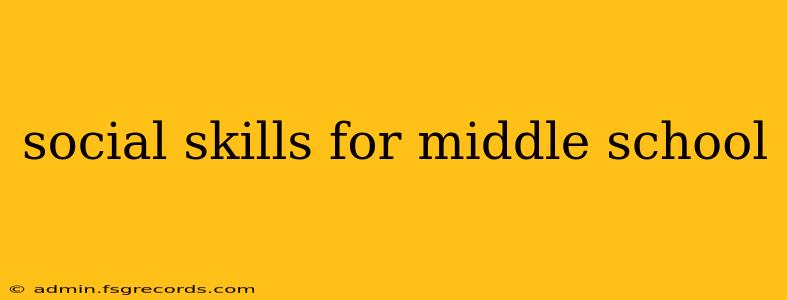Middle school. The very words conjure images of awkward encounters, shifting friendships, and the ever-present pressure to fit in. For many, it's a turbulent sea of social change, demanding a whole new set of navigation skills. This isn't just about popularity; it's about building confidence, fostering healthy relationships, and developing the emotional intelligence crucial for navigating life's challenges. This guide dives into the essential social skills middle schoolers need to thrive.
Understanding the Social Landscape of Middle School
Before we delve into specific skills, let's acknowledge the unique social dynamics of middle school. Hormones are raging, identities are forming, and peer influence is incredibly powerful. This creates a complex environment where navigating social situations requires a delicate balance of assertiveness, empathy, and self-awareness.
The Shift in Social Dynamics
Elementary school's simpler social structures give way to more complex peer groups and social hierarchies in middle school. Cliques form, friendships shift, and the pressure to conform can be intense. Understanding this shift is the first step in helping your child (or yourself, if you're a middle schooler reading this!) navigate these waters successfully.
Key Social Skills for Middle Schoolers
Here are some crucial social skills to focus on, broken down for clarity and impact:
1. Communication Skills: Speaking Up and Listening Actively
- Clear and Assertive Communication: Learning to express needs and opinions respectfully is paramount. This involves using "I" statements ("I feel frustrated when...") rather than blaming others. Role-playing different scenarios can be incredibly helpful.
- Active Listening: Truly hearing what others say, asking clarifying questions, and showing genuine interest builds strong relationships. It's more than just hearing; it's about understanding the other person's perspective.
- Nonverbal Communication: Body language—eye contact, posture, facial expressions—plays a significant role in communication. Teaching kids to be aware of their nonverbal cues and interpret others' can prevent misunderstandings.
2. Empathy and Perspective-Taking: Walking in Someone Else's Shoes
Empathy, the ability to understand and share the feelings of others, is crucial for building strong relationships. Encourage your middle schooler to:
- Consider different viewpoints: Help them see situations from others' perspectives, even if they don't agree.
- Practice kindness and compassion: Acts of kindness, even small ones, build positive relationships and create a more supportive environment.
3. Conflict Resolution: Handling Disagreements Maturely
Disagreements are inevitable. Equipping middle schoolers with conflict resolution skills is vital:
- Calm Communication: Teach them to stay calm and avoid escalating arguments.
- Finding Common Ground: Help them identify shared goals or interests to find solutions that work for everyone.
- Seeking Mediation: Knowing when to seek help from a trusted adult is a valuable skill.
4. Building and Maintaining Healthy Relationships: Quality over Quantity
- Choosing Friends Wisely: Encourage them to choose friends who treat them with respect and support their well-being.
- Setting Boundaries: Learning to say "no" and establish healthy boundaries is crucial for self-respect and maintaining positive relationships.
- Managing Online Interactions: Navigating social media responsibly and understanding the impact of online interactions is essential in today's digital age.
5. Self-Awareness and Emotional Regulation: Understanding and Managing Emotions
- Identifying Emotions: Helping middle schoolers identify and name their emotions is the first step in managing them effectively.
- Developing Coping Mechanisms: Teaching healthy ways to cope with stress, anxiety, and anger (e.g., exercise, deep breathing, talking to a trusted adult) is vital.
Supporting Middle Schoolers' Social Development
Parents, educators, and mentors play a crucial role in fostering these essential social skills. Open communication, active listening, and providing opportunities for social interaction and skill-building are key. Remember, middle school is a journey of growth, and providing the right support can make all the difference.

